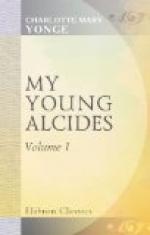And I always saw the disgusted and bored expression most prominently in her performance, which at the best could never have given the grandeur of the pose she made him take, with the lion skin over his shoulder, and the arrows and bow in his hand. He muttered that a rifle would be more rational, and that he could hold it better, but withdrew the protest when he found that Hippo was ready to implore him to teach her to shoot with pistol, rifle—anything.
“Your brother can show you. You’ve only to fire at a mark,” was all that could be got out of him.
Nor would he be entrapped into a beneficent talk. His great talent for silence served him well, and though I told him afterwards that he had not done Hippo justice—for she honestly wanted an opening for being useful—he was not mollified. “I don’t like tongue,” was all he further said of her.
But whatever Hippo was, or whatever she did, I shall always be grateful to her for that photograph.
CHAPTER X. DERMOT’S MARE.
All this time Dermot Tracy had been from home. He had not come back after the season, but had been staying with friends and going to various races, in which, as usual, he had heavy stakes. He persuaded my two nephews to meet him at Doncaster, where he ran one of the horses bred on his Irish estate, and afterwards to go and make him a visit at Killy Marey, County Kildare, where he used to stay about once a year, shooting or hunting, as the season might be, and always looking after his horses and entertaining all the squires and squireens of the neighbourhood, and many of the officers from the Curragh. The benefit of those visits was very doubtful both as to morals and purses, and Lord Erymanth pointedly said he was sorry when he heard that Harold and Eustace were of the party.
I do not know whether Lady Diana viewed them as bad companions for her son, or her son as a bad companion for them; but she was very severe about it, and when I thought of the hunt dinner at Foling, my heart sank, even while I was indignant at any notion of distrusting Harold; and it did indeed seem to me that he had learnt where to look for strength and self-command, and that he had a real hatred and contempt of evil. Yet I should have been more entirely happy about him if he had not still held aloof from all those innermost ordinances, of which he somehow did not feel the need, or understand the full drift. Nor would he bow himself to give to any man the confidence or the influence over him he had given to an incapable girl like me. And if I should have feared for the best brought up, most religious of young men, in such scenes as I was told were apt to take place at Killy Marey, how could I not be anxious for my nephews? But nothing ever turns out as one expects.




